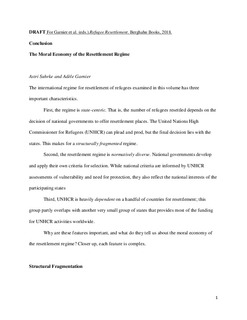Conlusion: The Moral economy of the resettlement regime
Chapter
Permanent lenke
http://hdl.handle.net/11250/2560555Utgivelsesdato
2018-01-01Metadata
Vis full innførselSamlinger
- Publications [1488]
Originalversjon
in Adèle Garnier, Liliana Lyra Jubilut, and Kristin Bergtora Sandvik: Refugee resettlement. Power, Politics, and Humanitarian Governance. Oxford: Berghahn BooksSammendrag
The international regime for resettlement of refugees examined in this volume has three important characteristics. First, the regime is state-centric. That is, the number of refugees resettled depends on the decision of national governments to offer resettlement places. The United Nations High Commissioner for Refugees (UNHCR) can plead and prod, but the final decision lies with the states. This makes for a structurally fragmented regime. Second, the resettlement regime is normatively diverse. National governments develop and apply their own criteria for selection. While national criteria are informed by UNHCR assessments of vulnerability and need for protection, they also reflect the national interests of the participating states Third, UNHCR is heavily dependent on a handful of countries for resettlement; this group partly overlaps with another very small group of states that provides most of the funding for UNHCR activities worldwide. Why are these features important, and what do they tell us about the moral economy of the resettlement regime? Closer up, each feature is complex.
Utgiver
Berghahn BooksSerie
Refugee resettlement. Power, Politics, and Humanitarian GovernanceRefugee resettlement: Power, politics, and humanitarian governance
